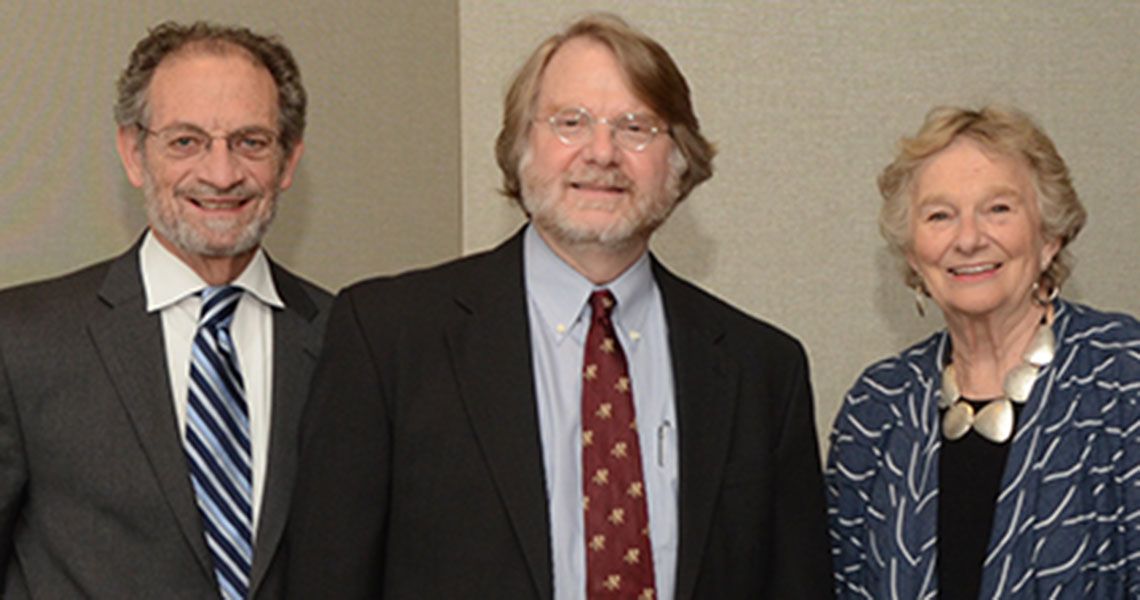“I learned the importance of narrative from my own children,” said Eugene V. Beresin, M.D., professor of psychiatry at Harvard Medical School and executive director of the Clay Center for Young Healthy Minds at Massachusetts General Hospital (Clay Center). “Narratives are the basis for learning what’s right and wrong, and for the development of the self,” he explained during the 11th Annual Jerry M. Wiener, M.D., Lecture in Psychiatry and Behavioral Sciences, April 3.
Beresin’s talk, titled “Doctor as Teacher and Healer: Fulfilling Our Social Contract,” addressed the importance of using stories to educate the public about mental health. “Stories can uncomplicate our thinking by making the complicated accessible,” he said, noting that the recently launched Clay Center’s mission is to promote mental health and resilience in children, youth, and families through education and prevention.
During her opening remarks, Louise Wiener, widow of Jerry M. Wiener, the psychiatrist whose 21-year legacy as chair of the Department of Psychiatry and Behavioral Sciences at GW’s School of Medicine and Health Sciences (SMHS) the lecture celebrates, recalled how this issue was of great importance to her late husband. “Jerry advocated for a truly educated, thoughtful focus around the public expression of psychiatry and its role in the larger community,” she noted.
“One in four people will suffer from mental illness at some point during their lives,” Beresin reminded his audience of SMHS faculty, students, and residents, “but when do you see mental health news? When there’s a school shooting, a marathon bombing, a disaster.” He stressed the importance of reaching children during their formative years, since half of all of psychiatric problems develop before age 14. “There are only 7,000 to 8,000 child psychiatrists in the country and about 6,000 child psychologists to care for 20 million youth with psychiatric disorders,” Beresin said. “Because of clinical shortages, a lot of care has fallen into the hands of primary care physicians and pediatricians. They need education, too.”
The Clay Center, which uses the epithet D.R.E.A.M. — Developing Resilience Through Engagement, Awareness, and Media — is working to develop metrics to measure the outcomes of public education on mental illness. “Our website is the cornerstone of our public education efforts,” Beresin explains. “We want it to appear homey, but not homemade. Polished, but not corporate. We want to convey clinical wisdom without pathologizing development, we want to be a trusted friend, and we want to have a strong, independent brand so that people will come back again and again.” The website’s success is measured by participation metrics, community engagement, surveys, and online research, he said.
Beresin cited Time To Change, a United Kingdom Department of Health campaign aimed at destigmatizing mental health problems, as a model for success. “A lot of it is telling the stories of public figures, such as the Minister of Finance who talks about his bipolar disorder publically,” he said. “They’ve really changed attitudes and behavior towards mental health.”
Beresin closed his talk by sharing an 8-minute video, one of three developed by the Clay Center and available on their website, called Sasha’s Story. In the video, the parents of a champion swimmer who committed suicide, and the psychiatrist who treated her, give advice on recognizing signs of trouble. “Our first audience is going to be parents because we want to make sure they are cared for in order to help their kids,” Beresin said. “We want to destigmatize psychiatric disorders and to enhance early detection of emotional and social problems. We want our site to be a virtual community.”



